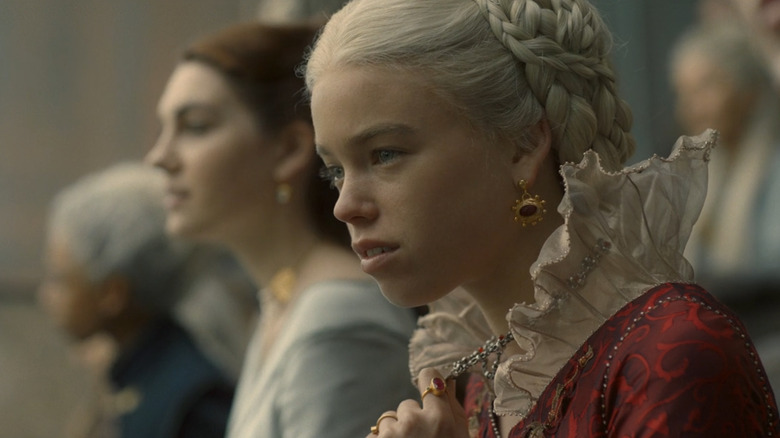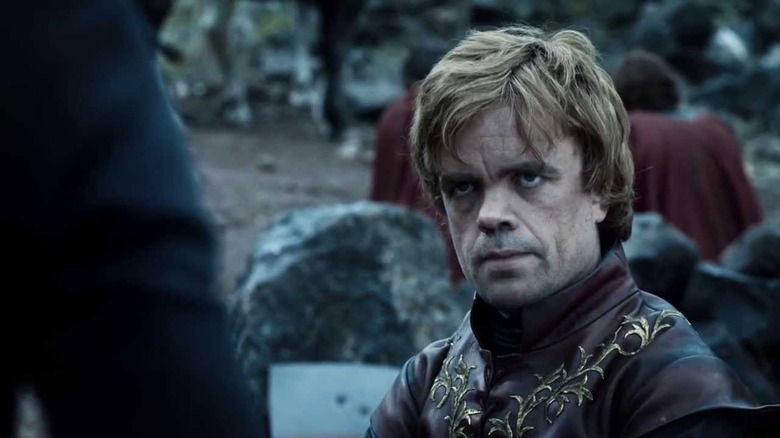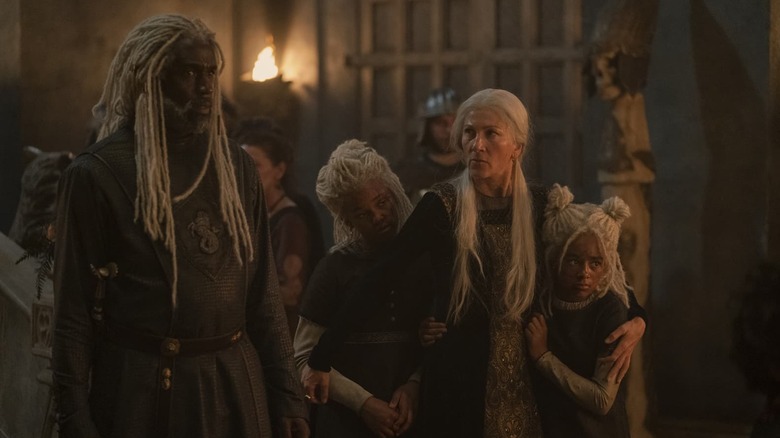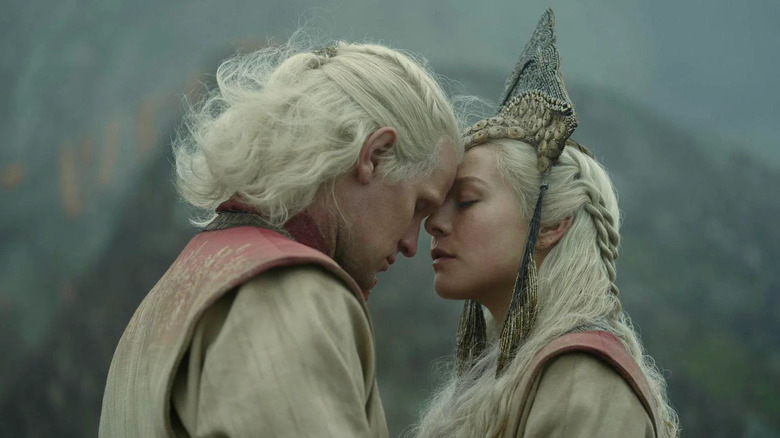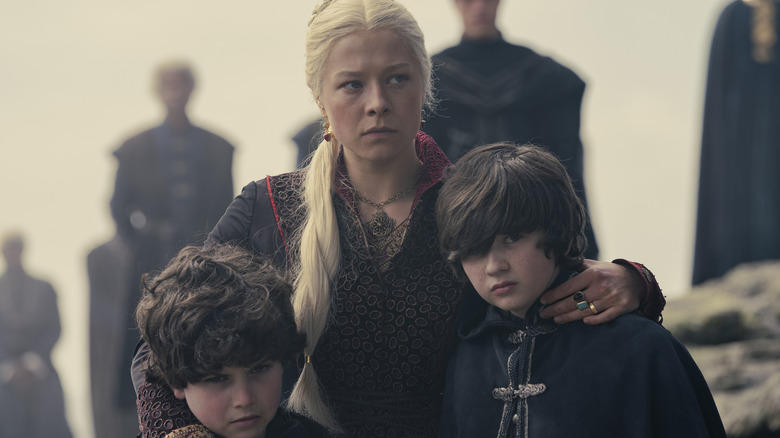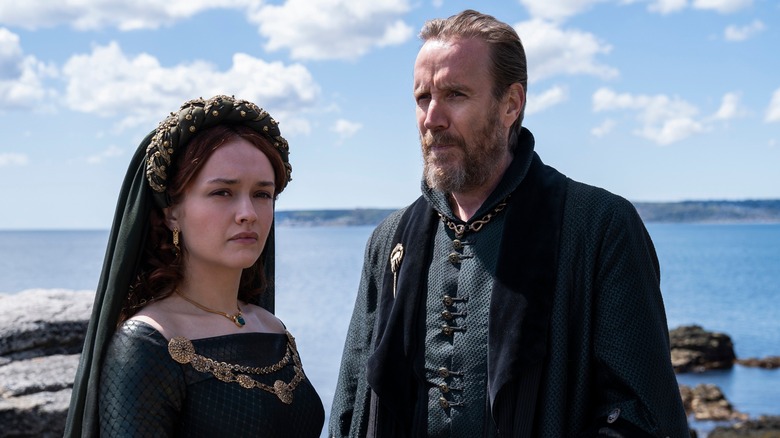You Can Root For House Of The Dragon Characters Even If They're Evil
Television these days has a bit of a morality problem. It's not that shows are afraid to have morally dubious anti-hero characters, but more that they feel the need to explicitly and repeatedly remind viewers that the main characters are bad, and that we shouldn't be rooting for them. It's a trend that feels like the writers overreacting to Twitter discourse, in which the idea that depiction doesn't equal endorsement in fiction seems to be increasingly overlooked.
Perhaps it's a response to what happened with shows like "Breaking Bad," or "The Sopranos," where many fans loudly did not seem to get that the protagonists being compelling characters doesn't make them heroes. Either way, TV shows seem increasingly interested in spelling out exactly what's wrong with the characters and explaining why you're missing the point if you idolize them.
One of the more obvious examples is the "Pickle Rick" episode of "Rick and Morty," in which Rick's therapist calmly lays out to him (and us) exactly what Rick's issue is. Another, much more frustrating example is the "Game of Thrones" finale, which featured Tyrion giving a long, preachy monologue about how Daenerys was bad the whole time actually, and we were wrong to root for her.
The "Game of Thrones" example is so frustrating because, when the show was at its best in its earlier seasons, the writers' lack of interest in examining everything through a 21st-century lens of morality was one of its best features. Throughout the first three or four seasons, characters were casually committing incest and murder and, for the most part, viewers still got invested in them anyway.
It's a cruel world
"Game of Thrones" season 1 featured Catelyn being cruel to Jon Snow, and Tyrion casually giving a dangerous mountain clan a bunch of weapons, which they then used to terrorize random civilians. Despite the final conflict between Tyrion and Daenerys being centered around the lives of the citizens of King's Landing, early Tyrion never cared much about the smallfolk, and the show left it up to us to deal with that part of him. But "Game of Thrones" grew increasingly uncomfortable with shades of gray, turning Tyrion into a generic good guy and no longer punishing Jon for making major mistakes that would've gotten an early-season character killed.
It's this that makes "House of the Dragon" feel like such a return to form. Much like early "Thrones," so far it's been incredibly comfortable with the fact that all of its characters are sort of terrible. In this latest episode alone, we see Alicent (Olivia Cooke) demand the maiming of a child. We see Viserys (Paddy Considine) threaten to cut out people's tongues out for acknowledging the truth about his daughter's children. We see Rhaenyra (Emma D'Arcy) hook up with her uncle Daemon (Matt Smith), and then plot with her uncle to murder her current husband. We soon after find out that she lets Laenor live, but as we watch Laenor's parents mourn his fake-death, it's clear this isn't a victimless crime. (And then of course, they do in fact murder a real person to pull off the ruse.)
If the "Am I the Asshole?" subreddit existed in this world, any post from these characters about their given situation would receive a firm "Everyone Sucks Here" ruling. That's part of what makes the show so interesting, but also what might make it a little depressing for some viewers to watch.
Is there anyone left to root for?
A common argument against "House of the Dragon," and others shows like this, is that there's not much fun in rooting for characters who are clearly terrible. Even among fans, there's this idea that the correct way to watch the show is accept that everyone sucks and to root for their downfall, not their success. "The show is trying to tell you they all suck. You aren't listening. That is the lesson," said one fan account. "We cheer Targaryen downfall, this is our triumph."
It's a sentiment common among fans of shows like "Succession" as well, which is also about a bunch of powerful rich people scheming against each other in their pursuit of even more power and money. As one TV critic put it: "It's a show about billionaires: You're supposed to root for their glorious self-destruction and the deliciousness of their failures."
Neither of these two points are wrong exactly, but it's an argument that can be taken to an extreme. As anyone who's ever spent a little too much time in online forums around a show can probably attest, it seems very easy for people to fall into the trap of treating fictional characters as if they're real people. Most of us have heard the argument that those who like Walter White in "Breaking Bad" are toxic dudes with entitlement issues, as if there aren't plenty of viewers who simply find it fun to root for a show's protagonist despite his many faults.
Embracing the characters, incest and all
Placing fictional characters within this sort of moralistic framework doesn't just make for annoying conversations; it's also simply a less interesting way to approach a show with characters who aren't written as heroes or villains. Discussing "House of the Dragon" in terms of which character deserves what is sort of missing the point, because the show itself isn't interested at all in the question of who "deserves" anything. Not to mention, if the point of a TV show is to root for all the characters to fail, then that's kind of a depressing viewing experience. Why would you want to watch a show where you're supposed to righteously root for bad things to happen to all the characters?
The other side to this is people who do root for the characters, but find themselves jumping through hoops to defend their actions. We're all familiar with the "Breaking Bad" fan who has a million excuses prepared for every single decision Walt makes, or the "Game of Thrones" fan who seriously argues that it was actually good that Jaime pushed that small child out of that window. Just as its okay to root for a character even though they do bad things, it's also okay to admit that the character is bad as you root for them. With that in mind...
Team Rhaenyra
Look, was it nice of Rhaenyra to fake-murder her first husband for the sake of marrying her uncle-lover? No. Was it particularly responsible of her to have three separate children with a man who looks nothing at all like her husband, and then lie about their parentage to everyone even though the truth is obvious? Also no.
But at the end of the day, Rhaenyra is a cool, mostly intelligent person who's spent the whole show trapped in a precarious social position. She sometimes takes risks in pursuit of her own happiness, and she does it without any of the self-righteousness that Alicent uses to justify her actions. That's why I can sleep perfectly fine at night as a member of Team Black, even as I know that many of Alicent's concerns about Rhaenyra are legitimate.
At the end of the day, standards for fictional characters are different than the standards for people in real life. On TV and film, being cool and competent will get you far more sympathy from the audience than being good. It's why everyone still rooted for the family in "Parasite" even as they got multiple working-class people fired early in the movie. Meanwhile, things like being whiny or self-righteous — relatively harmless crimes in the grand scheme of things — can alienate audiences. It's why the most commonly hated characters on "The Sopranos" are not the murderers, but Tony's kids who complain a lot.
It's also why so many viewers don't like Alicent, who masks her thirst for power under a holier-than-thou attitude. Objectively, Daemon's a worse person, but at least Daemon's upfront about how terrible he is, which makes it fun to notice all the little moments where he shows real kindness.
It's okay to root for Alicent too
But as much as Twitter likes to assign morality to your opinions on film and TV, you don't have to get defensive or feel any guilt if you still support Alicent either. She's another character who's trapped in a precarious social position, who's simply handling it in a different (arguably less healthy but perhaps more relatable) way than her childhood friend Rhaenyra.
Yes, she's become increasingly reminiscent of Cersei Lannister, but Cersei had plenty of her own fans as well. What made the Cersei fans fun was the way they ironically embraced girlboss rhetoric when cheering her on. Most of them weren't seriously defending Cersei's many, many crimes. They just reveled in how delightfully petty Cersei's brand of evil was. It's the same attitude I see when it comes to Daemon Targaryen. Daemon's fans are a lot more fun when they're joking around how much he annoys his brother; they're less fun when they try to sincerely justify him murdering his first wife.
The whole appeal of "House of the Dragon," as well as what made "Game of Thrones" such a standout in its early seasons, is how expertly the show makes any sort of modern understanding of morality irrelevant. It's a show where everyone has an understandable reason for what they do, not a justifiable one. This is fundamentally a world with different values and rules than our own; this might make it uncomfortable to watch at times, but it's also what makes it so interesting.
There's nothing at all wrong with rooting for any of these characters, of choosing Team Black or Team Green. But whatever side you pick, just make sure to leave any moral posturing at the door.
